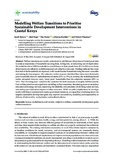| dc.contributor.author | Katuva, Jacob | |
| dc.contributor.author | Hope, Rob | |
| dc.contributor.author | Foster, Tim | |
| dc.contributor.author | Koehler, Johanna | |
| dc.contributor.author | Thomson, Patrick | |
| dc.date.accessioned | 2021-02-24T11:54:48Z | |
| dc.date.available | 2021-02-24T11:54:48Z | |
| dc.date.issued | 2020 | |
| dc.identifier.citation | Katuva, J.; Hope, R.; Foster, T.; Koehler, J.; Thomson, P. Modelling Welfare Transitions to Prioritise Sustainable Development Interventions in Coastal Kenya. Sustainability 2020, 12, 6943. https://doi.org/10.3390/su12176943 | |
| dc.identifier.uri | https://opendocs.ids.ac.uk/opendocs/handle/20.500.12413/16311 | |
| dc.description.abstract | Welfare transitions are weakly understood in sub-Saharan Africa due to limited panel data to analyze trajectories of household escaping from, falling into, or remaining out of deprivation. We model data from 3500 households in coastal Kenya in three panels from 2014 to 2016 to evaluate determinants of welfare by multidimensional and subjective measures. Findings indicate that more than half of the households are deprived, with female-headed households being the most vulnerable and making the least progress. The subjective welfare measure identified three times more chronically poor households than the multidimensional metric (27% vs. 9%); in contrast, the multidimensional metric estimated twice as many ‘never poor’ households than the subjective measure (39% vs. 16%). The ‘churning poor’ were broadly consistent for both measures at roughly half the sample. Four welfare priorities converged from modelling welfare transitions. Broadening access to secondary education and energy services, improving the reliability and proximity of drinking water services, and ending open defecation improve welfare outcomes. While the policy implications do not align neatly with Kenya’s national and county government mandates, we argue that prioritising fewer but targeted sustainable development goals may improve accountability, feasibility, and responsibility in delivery if informed by local priorities and political salience. | |
| dc.publisher | MDPI, Basel, Switzerland | |
| dc.rights.uri | https://creativecommons.org/licenses/by/4.0/ | |
| dc.title | Modelling Welfare Transitions to Prioritise Sustainable Development Interventions in Coastal Kenya | |
| dc.type | Article | |
| dc.rights.holder | © 2020 by the authors | |
| dc.identifier.externaluri | http://dx.doi.org/10.3390/su12176943 | |
| dc.identifier.ag | ES/J018120/1 | |
| dc.identifier.doi | 10.3390/su12176943 | |


